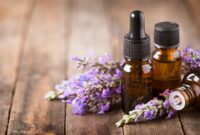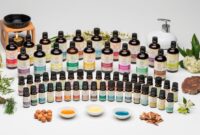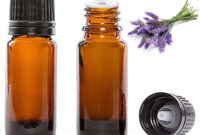Buying essential oils is an adventure into the realm of natural healing and aromatic delight. Essential oils, extracted from plants, offer a treasure trove of therapeutic benefits and practical applications. This guide will illuminate the path to selecting and utilizing essential oils with confidence, ensuring you reap their full potential.
From understanding the diverse properties of essential oils to exploring their myriad uses, this comprehensive guide empowers you to harness the power of nature’s essence.
Essential Oil Market Overview
The global essential oil market is a rapidly growing industry, driven by rising consumer demand for natural and organic products. The market size is expected to reach USD 25.65 billion by 2028, exhibiting a CAGR of 8.7% during the forecast period (2021-2028).
Key Market Segments
The essential oil market is segmented based on type, source, application, and region. Major types of essential oils include citrus oils (e.g., orange, lemon), mint oils (e.g., peppermint, spearmint), and floral oils (e.g., lavender, rose).
Market Trends
Key trends shaping the essential oil market include:
- Rising consumer preference for natural and organic products
- Growing awareness of the therapeutic benefits of essential oils
- Expansion of the aromatherapy and spa industries
- Increasing demand for essential oils in personal care and cosmetic products
Factors Driving Market Growth
Several factors are driving the growth of the essential oil market:
- Growing consumer awareness of the health and wellness benefits of essential oils
- Increasing disposable income in emerging economies
- Rising popularity of DIY (do-it-yourself) beauty and skincare products
- Expansion of the online retail channel for essential oils
Benefits and Uses of Essential Oils
Essential oils, extracted from plants, possess therapeutic properties that have been utilized for centuries. These natural compounds offer a wide range of benefits, including relaxation, stress relief, pain management, and improved overall well-being.
Therapeutic Properties of Essential Oils
- Antimicrobial:Some essential oils, such as tea tree oil and oregano oil, have antimicrobial properties that can help fight bacteria, viruses, and fungi.
- Anti-inflammatory:Essential oils like chamomile and lavender have anti-inflammatory properties that can reduce swelling and pain.
- Analgesic:Certain essential oils, such as peppermint and eucalyptus, have analgesic properties that can relieve pain and muscle tension.
- Sedative:Essential oils like lavender and valerian root have sedative properties that can promote relaxation and sleep.
- Stimulating:Oils like rosemary and peppermint have stimulating properties that can improve focus and alertness.
Applications of Essential Oils
Essential oils can be used in various ways, including:
- Aromatherapy:Inhaling essential oils through a diffuser or humidifier can have therapeutic effects on mood, sleep, and stress levels.
- Topical application:Essential oils can be diluted with a carrier oil (such as jojoba or coconut oil) and applied to the skin for massage, pain relief, or skin care.
- Inhalation:Some essential oils can be inhaled directly from the bottle or a tissue for quick relief from congestion or headaches.
- Bath:Adding a few drops of essential oils to a bath can create a relaxing or invigorating experience.
Examples of Essential Oils and Their Uses
- Lavender:Relaxation, sleep, pain relief, skin care
- Peppermint:Headache relief, nausea, muscle pain
- Tea tree oil:Antiseptic, acne treatment, fungal infections
- Eucalyptus:Decongestant, respiratory support, pain relief
- Rosemary:Focus, memory, hair growth
Factors to Consider When Buying Essential Oils
Choosing high-quality essential oils is crucial for ensuring their effectiveness and safety. Several factors should be taken into consideration when making a purchase.
Purity
Essential oils should be 100% pure, meaning they have not been diluted with carrier oils or other substances. Look for products that are labeled as “pure” or “therapeutic grade.” Avoid oils that contain additives, as they can reduce the potency and alter the therapeutic properties.
Source
The source of the plant material used to extract the essential oil is important. Essential oils derived from organically grown plants are preferred, as they are free from pesticides and other chemicals that can compromise their quality.
Extraction Method
The extraction method used to obtain the essential oil can affect its composition and therapeutic value. Steam distillation is a common and reliable method that preserves the natural constituents of the oil. Cold-pressing is another option, particularly for citrus oils, as it avoids the use of heat.
Identifying Counterfeit or Diluted Oils
To avoid counterfeit or diluted oils, consider the following tips:
- Price:High-quality essential oils are typically more expensive than synthetic or diluted versions. Be wary of oils that are significantly cheaper than the market average.
- Labeling:Check the label for information on purity, source, and extraction method. Avoid oils with vague or incomplete labeling.
- Viscosity:Pure essential oils are usually viscous and may leave a slight residue on the skin. Watery or runny oils may indicate dilution.
- Aroma:The aroma of an essential oil should be strong and characteristic of the plant from which it is derived. Weak or artificial scents may suggest adulteration.
Different Types of Essential Oils

Essential oils encompass a diverse range of aromas and therapeutic properties. To facilitate their understanding, we can categorize them based on their primary characteristics and uses.
The following table provides a comparative overview of different types of essential oils, highlighting their distinct aromas, benefits, and applications:
Citrus Oils
| Oil | Aroma | Benefits | Applications |
|---|---|---|---|
| Lemon | Fresh, citrusy | Mood-boosting, purifying, antibacterial | Diffusion, cleaning, skincare |
| Orange | Sweet, uplifting | Calming, reduces stress, promotes digestion | Diffusion, massage, bath salts |
| Grapefruit | Zesty, energizing | Appetite suppressant, lymphatic stimulant, mood enhancer | Diffusion, massage, body scrubs |
Floral Oils, Buying essential oils
| Oil | Aroma | Benefits | Applications |
|---|---|---|---|
| Lavender | Floral, calming | Promotes relaxation, reduces anxiety, aids sleep | Diffusion, massage, pillow spray |
| Rose | Sweet, romantic | Mood-boosting, aphrodisiac, antibacterial | Diffusion, skincare, perfume |
| Jasmine | Exotic, sensual | Reduces stress, promotes euphoria, relieves pain | Diffusion, massage, aromatherapy jewelry |
Spicy Oils
| Oil | Aroma | Benefits | Applications |
|---|---|---|---|
| Cinnamon | Warm, spicy | Anti-inflammatory, antimicrobial, stimulates circulation | Diffusion, massage, bath salts |
| Ginger | Sharp, invigorating | Digestive aid, reduces nausea, boosts energy | Diffusion, massage, cooking |
| Clove | Strong, pungent | Antiseptic, analgesic, immune booster | Diffusion, toothache relief, massage |
Safety Considerations for Essential Oils: Buying Essential Oils
Essential oils are concentrated plant extracts that offer numerous benefits. However, it’s crucial to use them safely to avoid potential risks. Proper dilution and avoiding direct skin contact are essential precautions.
Potential Risks and Precautions
Some essential oils can cause skin irritation, allergic reactions, or respiratory issues if used improperly. Diluting them in a carrier oil, such as jojoba or almond oil, is recommended before applying them to the skin. Additionally, avoid using essential oils near the eyes, nose, or mouth.
Importance of Proper Dilution
Diluting essential oils helps reduce their potency and minimize the risk of skin reactions. The recommended dilution ratio varies depending on the oil and the intended use. It’s generally advised to use 2-3 drops of essential oil per 5ml of carrier oil for topical applications.
Safe Storage and Handling
Essential oils should be stored in dark, cool, and dry places. Exposure to light, heat, or air can degrade their quality and make them less effective. Keep them out of reach of children and pets. Avoid using cracked or damaged containers as they may contaminate the oils.
Essential Oils for Specific Purposes
Essential oils offer a range of therapeutic benefits and can be used for various purposes. Here’s a comprehensive guide to help you choose the right essential oil for your specific needs:
For Relaxation
- Lavender:Known for its calming and soothing effects, lavender oil promotes relaxation and reduces stress.
- Chamomile:A gentle oil that calms the mind and body, reducing anxiety and promoting sleep.
- Bergamot:Uplifting and calming, bergamot oil helps reduce stress and improve mood.
For Pain Relief
- Peppermint:A natural pain reliever, peppermint oil reduces inflammation and numbs pain.
- Eucalyptus:Known for its analgesic and anti-inflammatory properties, eucalyptus oil relieves muscle pain and headaches.
- Wintergreen:A potent pain reliever, wintergreen oil contains methyl salicylate, which blocks pain signals.
For Skin Care
- Tea Tree:Antibacterial and anti-inflammatory, tea tree oil treats acne, reduces redness, and promotes skin healing.
- Frankincense:Known for its regenerative properties, frankincense oil helps reduce wrinkles, scars, and stretch marks.
- Rose:A gentle and nourishing oil, rose oil hydrates and soothes the skin, reducing inflammation and redness.
Where to Buy Essential Oils

Finding reputable suppliers and ensuring the authenticity of essential oils is crucial. Explore various channels for purchasing essential oils, each with its advantages and disadvantages.
Online Retailers
- Pros:Wide selection, competitive pricing, convenience.
- Cons:Difficulty verifying authenticity, potential for fraud.
Specialty Stores
- Pros:Knowledgeable staff, ability to sample and test oils, reputable suppliers.
- Cons:Limited selection, higher prices.
Health Food Stores
- Pros:Focus on natural products, often carry organic and therapeutic-grade oils.
- Cons:Smaller selection, may not have specialized staff.
Tips for Finding Reputable Suppliers
- Check for certifications and industry affiliations (e.g., National Association for Holistic Aromatherapy).
- Read customer reviews and testimonials.
- Contact the supplier and ask about their sourcing and testing practices.
- Consider purchasing from local suppliers to ensure freshness and reduce shipping costs.
Last Word

In the realm of essential oils, knowledge is the key to unlocking their full potential. By embracing the insights shared in this guide, you can navigate the world of essential oils with confidence, selecting and using them wisely to enhance your well-being and create a harmonious environment.
Quick FAQs
What are the key factors to consider when buying essential oils?
Purity, source, extraction method, and reputation of the supplier are crucial factors to ensure the quality and effectiveness of essential oils.
How can I avoid counterfeit or diluted essential oils?
Look for reputable suppliers, check for third-party certifications, and be wary of unusually low prices.
What are some common uses of essential oils?
Aromatherapy, topical application, inhalation, and use in household cleaning products are popular ways to harness the benefits of essential oils.


